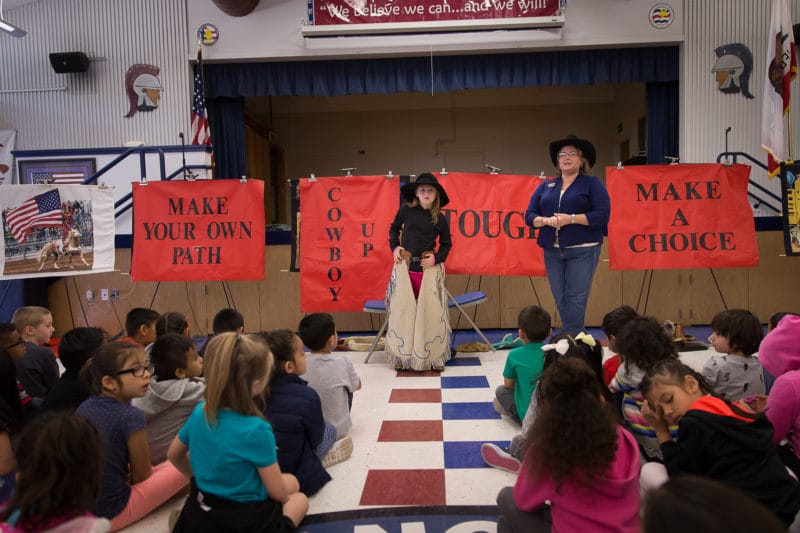Tucson students ‘cowboy up’ in hands-on rodeo lesson
Tucson students experienced an immersive rodeo program that teaches Western heritage, rodeo skills, and resilience through the "cowboy up" mindset.

A few hundred Tucson students were treated to an immersive hands-on lesson in how to “cowboy up” Tuesday, thanks to a long-running and free program hosted by the Tucson Rodeo.
Now in its 35th year, the Rodeo Education And Children program introduces kids in kindergarten through sixth grade to the sport of rodeo, Western heritage and the working cowboy.
But it also tackles tough topics, including substance use and bullying, teaching students to be tough, stick to their values and refuse to give up.
A program of the nonprofit Cowboys and Kids, REACH was first offered in 1991 by Director Penny Conway, an elementary school teacher and rodeo competitor who lives in Payson.
Conway started the REACH as a way to educate kids about cowboys, traveling to schools throughout the county and presenting at assemblies during rodeo season. Eventually, the Tucson Rodeo offered to host field trips including REACH presentations on its grounds, becoming one of the first in the country to do so.
Now, REACH presentations are offered in 31 states and have reached millions of students.
“The traditional image of the cowboy is a bovine babysitter positioned on horseback or around a campfire. He believed his word was his bond and his reputation was built upon the quality of his work,” according to Cowboys and Kids’ website. “Today’s cowboy is anyone, rural and urban, regardless of race, creed, color, sex or background, who believes that character counts.”
Janet Houts loves teaching kids how to “cowboy up” and has been doing so for nearly 25 years through REACH, sometimes talking to as many as 1,600 kids a day.
Houts lives in California but travels to Tucson and other cities across the U.S. each year to teach REACH program presentations.
“We have visited over at least 3 million kids and adults nationally with this program,” said Houts. “Sometimes we’ll have 600 people in the barn for one presentation session.”

REACH presentations were offered during three separate time slots Monday and Tuesday, with kids and chaperones invited to explore the rodeo grounds, eat food, and watch events after the program.
Each presentation began with a lesson on the origin of rodeo, An opening ceremony kicks off each rodeo celebration, after which Houts teaches students about the different equipment used in rodeos, the various events and scoring systems.
She says her favorite part about the presentation is when she asks for volunteers to try on equipment, which is always a popular portion of the event.
“I'm very tickled to be a part of it, they just step right in and get it,” said Houts.
In addition to an education in rodeo, students are taught about being tough and not giving up in the face of adversity through the term “cowboy up.”
This saying has been associated with rodeos for years, and despite its roots in the Western lifestyle, it’s now universally used.
“Be tough in your mind and heart,” Houts told the kids, encouraging them to stand up against bullying and violence, and to show respect. “The cowboy is an independent, rugged individual who doesn't care about race, creed, sex or religion. Everyone works individually.”
Abbie Andrus is a University of Arizona alum and Tucson Spotlight reporter. Contact her at asandrus@arizona.edu.
Tucson Spotlight is a community-based newsroom that provides paid opportunities for students and rising journalists in Southern Arizona. Please support our work with a paid subscription.



